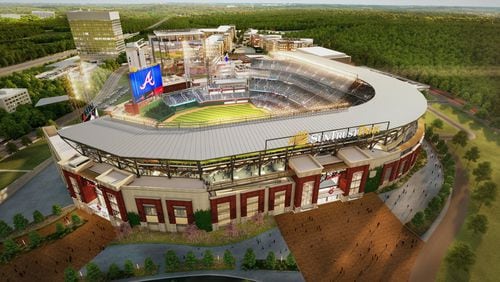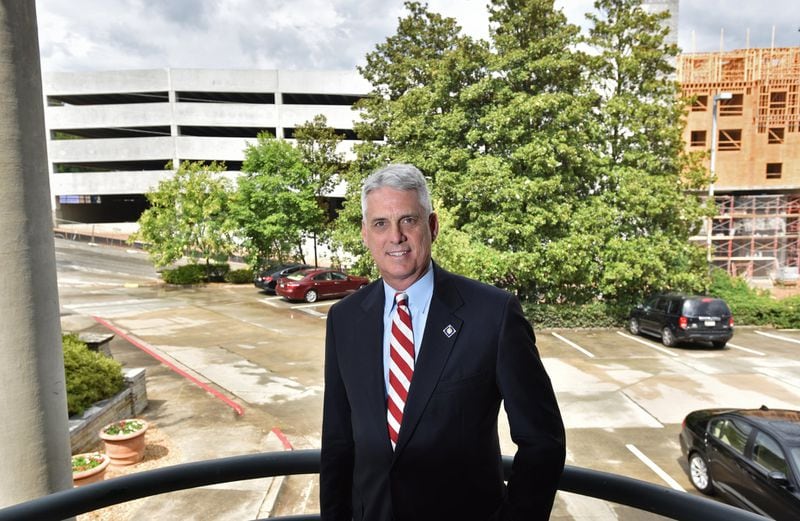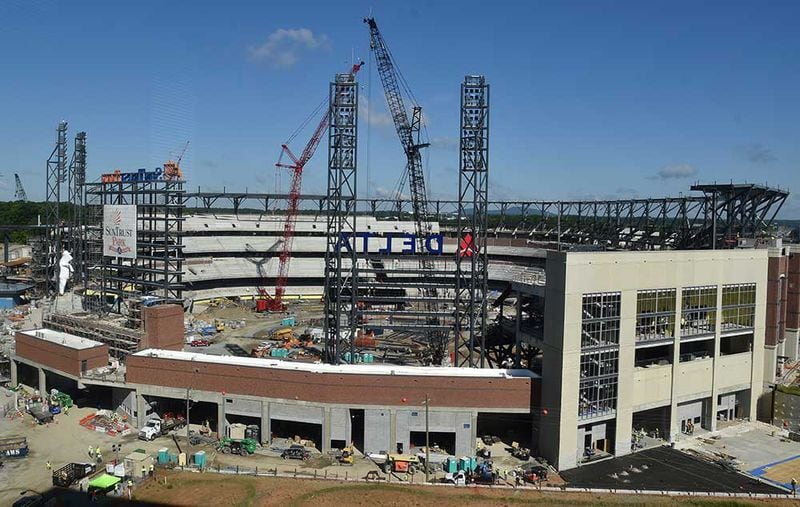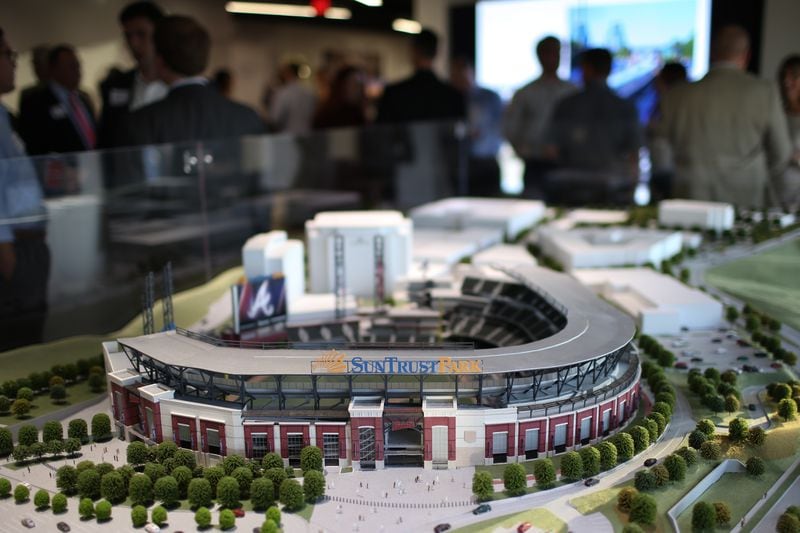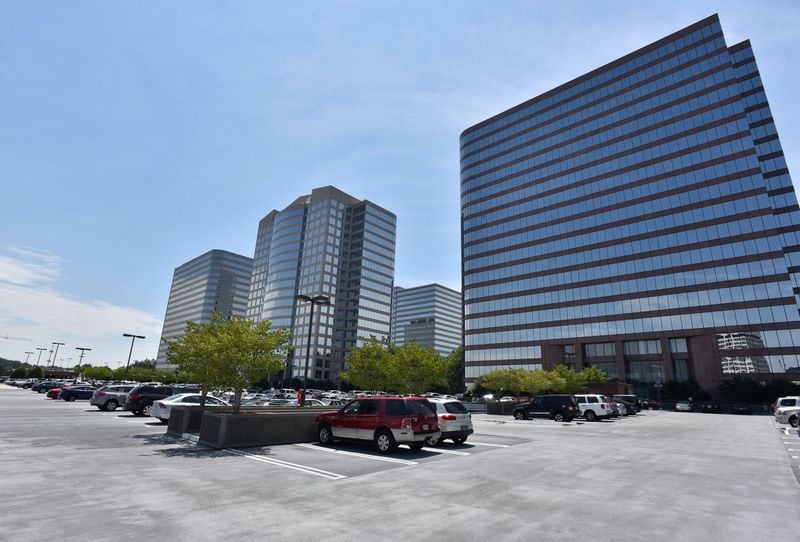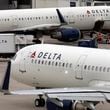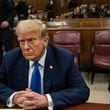A fan’s guide to parking at SunTrust Park
Will fans be able to park on public streets around SunTrust Park? No.
When will the Braves release its parking plan for the new stadium? A team spokeswoman said the plan will be forthcoming in a matter of weeks.
Has the team said how many parking spaces it will provide? At least 10,000.
How much will it cost? The team has not released pricing for SunTrust Park, but parking at Turner Field costs $10 in advance, and $15 on the day of the game.
Why is the county requiring licenses for private parking lots during stadium events? For public safety. Issuing permits allows the county to know which lots will offer parking during stadium events, and provide adequate traffic control for the cars and pedestrian traffic that will result.
Why is there a ban on licenses being issued to lots within a half-mile of the stadium? County officials say it is a public safety issue, and stress that there is an appeals process for property owners denied a license. Critics say it is an attempt to protect Braves parking revenue from potential competition and deny them fair use of private property.
The Atlanta Journal-Constitution asked Mike Plant, the Braves’ president of development, a handful of questions about the special event parking ordinance passed by Cobb County in February. Here is a complete transcript:
“Our commitment to Braves fans is to provide a safe and comfortable environment for them to enjoy their experience. For the majority of our fans, that experience starts with parking. We have a long history of working in partnership with private lots around our ballpark. We have stated from the outset of the project that we expect, and welcome, these private lots around SunTrust Park.
“With that understanding, we first want to maximize the parking that is owned or controlled by the ballclub because we know that we can ensure the best fan experience in our lots. Many of our fans pre-purchase parking spaces when they are buying their tickets. The parking vouchers are in the form of digital tickets so fans have easy and efficient access without having to carry paper tickets or parking passes. Having parking available to fans at the time of their ticket purchase – and in many cases built into their ticket package – is the best way to ensure the best fan experience possible.
Q: Did the team request parking restrictions around SunTrust Park?
“We know that when fans come to a Braves game, no matter where they park, they associate their experience with the Braves. Our concerns focused mainly on two areas – safety of the fans and the free flow of vehicles through the areas around the ballpark. With that in mind, we requested that the county create an ordinance covering an area around the ballpark to protect fans who are attending the game and ensure that they receive the same safety, security and convenience provided in the lots we control.”
Q: If so, why?
“We included the need for an ordinance in our discussions with the county because the ultimate expectation is that the Braves will resolve any issues to the satisfaction of our fans. Therefore, ordinances governing conduct and maintaining a consistent experience for our fans, regardless of where they park, has to be put in place.”
Q: How much of a problem have gypsy lots been at Turner Field?
“We have never tried to prevent private lots near Turner Field and we don’t plan to do that at SunTrust Park. That being said, we expect these lots to provide a safe environment for fans. Parking is a public safety issue that we take very seriously. We trust the leadership of Cobb County to set the benchmarks for these safety measures and to ensure they are met on gameday.”
Q: Does the team believe that gypsy lots pose a safety hazard?
“We know that on a gameday thousands of people will expect to park in a secure environment and want to safely navigate to the ballpark. As long as a private lot provides a secure environment and safe access, we have no objection to them being utilized on gameday.”
Update: The Atlanta Braves have released a parking plan for SunTrust Park, which includes a lineup of 19 parking lots and decks.
Editor's note: After the story was published, the parking restrictions were suspended, and then changed so that lots within a half mile of the stadium can charge for parking on game days and other stadium events.
Original story: Fred Beloin and his partners bought the office building on Heritage Court in 2003, long before the Atlanta Braves announced their intention to move in next door with a new stadium and sprawling mixed-use development.
Beloin said they had planned substantial investment in the property because of SunTrust Park’s opening next year — they’d need fencing, walls, and some combination of security gates and guards for the parking lot. The attorney had hoped to earn back a portion of that money by charging fans for use of their 100-space parking lot on some game days.
But Cobb County shut down that idea, when commissioners in February quietly passed an ordinance that outlaws property owners within a half-mile of the stadium from charging for parking during games and other special events at the stadium. SunTrust Park is partially funded with $400 million from Cobb taxpayers.
“This irks the (heck) out of me,” said Beloin, who has previously tangled with the county over zoning around the stadium, and was unaware of the ordinance until told about it by an Atlanta Journal-Constitution reporter. “They say they’re increasing my property value and then they do everything in their power to make sure I get no benefit out of it.”
Credit: Hyosub Shin
Credit: Hyosub Shin
The ordinance closes off potential revenue for dozens of businesses that own more than 10,000 private spaces — many of which could compete with the team for parking revenue.
County officials say the law is necessary for public safety, and note that property owners ineligible for a license because of their proximity to the stadium can file an appeal to the county commission. But critics see it as a heavy-handed attempt to protect Braves parking revenue, and help the team as it negotiates leases with nearby lot owners for supplemental parking.
The Braves collected $4.6 million in parking revenue last year at Turner Field, according to documents the team provided to the Atlanta Fulton County Recreation Authority.
For thousands of fans, the restriction could mean fewer parking options on game days, making it less convenient or more expensive to go to a stadium with no direct MARTA access. The full impact isn’t known because the Braves haven’t yet released their own parking plan.
“Why would the Cobb Commission not want fans to be able to park this close to the stadium?” Beloin said.
The ordinance was requested by the Braves and passed without public debate just three months before stiff primary election challenges to Commission Chairman Tim Lee and Commissioner Bob Ott, whose district includes SunTrust Park. Lee and Ott were co-sponsors of the ordinance.
Lee faces a July 26 runoff election against retired Marine Col. Mike Boyce, who made the chairman's handling of the stadium deal the centerpiece of his campaign. Ott easily won re-election.
Mike Plant, the Braves' president of development, said the team asked for the ordinance so private lots meet "benchmarks for safety." He said the team never requested a total ban on licenses within a half-mile of the stadium.
“We know that when fans come to a Braves game, no matter where they park, they associate their experience with the Braves,” Plant said. “Our concerns focused mainly on two areas — safety of the fans and the free flow of vehicles through the areas around the ballpark.
“With that in mind, we requested that the county create an ordinance covering an area around the ballpark to protect fans who are attending the game and ensure that they receive the same safety, security and convenience provided in the lots we control.”
Land around Turner Field has a similar restriction, but that area is dominated by houses, apartments, churches and industrial uses. Only 2 percent of property within Turner Field’s restricted parking area is zoned commercial, as opposed to well over 90 percent of the land surrounding SunTrust Park, according to an analysis of zoning information.
‘I haven’t heard a word about it’
The “Accessory Special Event Parking” ordinance was passed in a group of about 50 others, as part of the commission’s annual practice of updating county codes. There were three public hearings on the entire batch, but no public discussion of the parking ordinance beyond the title being read into the record three times.
Ordinances dealing with the height of weeds in yards, the number of allowable cars in driveways, and backyard chickens each received more debate.
County officials said the public notices and hearings gave interested citizens and businesses ample opportunity to learn about the ordinance and express an opinion. But it nonetheless escaped the attention of every business interest contacted by the AJC, including the head of the Cumberland Community Improvement District, which represents about 500 companies.
Tad Leithead, the CID chairman, said he was unaware of the ordinance until the AJC contacted him. And the Cumberland CID is a stadium development partner — it agreed to have property taxes raised on businesses within the district to help pay the public debt, and is contributing $15 million cash for associated infrastructure.
“Everything that is within a half-mile of the stadium is also in the CID, which makes it even more mystifying that I haven’t heard a word about it,” Leithead said.
Private lot restrictions were part of the county's stadium negotiations as far back as the preliminary agreement, called a Memorandum of Understanding (MOU), which was secretly negotiated before the deal became public in November 2013.
They are referred to as “gypsy lots” in the MOU, which says the county will provide “assistance with reviewing and understanding ordinance provisions, as needed, regarding street vendors, gypsy lots, and ticket scalping from the site or adjacent areas.”
The ordinance says lots within a half-mile of the stadium and three other facilities — the Cobb Energy Center, Kennesaw State’s Fifth Third Bank Stadium; and the Mable House amphitheater — are ineligible for a license if they are accessed from a public road.
Property owners outside the half-mile zone must submit property and ownership information along with a parking plan as part of the long license application. The ordinance details operational requirements for licensed lots.
Cartersville attorney Lester Tate, who reviewed the ordinance for the AJC, said the blanket prohibition against issuing licenses within a half-mile of the stadium is ripe for legal challenge.
“I think what you’re probably dealing with is equal protection, in other words: They’re treating the Braves different than they’re treating other people,” Tate said. “I don’t know that they can deny all access to parking lots from a public roadway when a less restrictive means might be to require the owner of a private lot to provide an off-duty police officer to direct traffic.”
Cobb County Attorney Deborah Dance said her office reviewed the ordinance before it was passed, but provided the AJC with a statement saying it is currently taking another look and may recommend changes.
Pedestrian safety, traffic flow paramount, Lee says
Chairman Lee, who has faced repeated criticism over transparency issues, did not answer specific questions from the AJC. Instead, he provided a statement that says the ordinance was "recommended by staff" and "all five commissioners agreed this was the best solution."
“I certainly have no concerns about property owners selling parking,” Lee said in the statement. “Outside the (half-mile) radius they can apply to offer parking, and property owners inside the radius can appeal to do the same. We will work with them so long as it doesn’t pose a threat to pedestrian safety or traffic flow.”
Brian Robinson, former communications director for Gov. Nathan Deal who is now a consultant on Lee's political campaign, also contacted the AJC to say he had "concerns" about the AJC's reporting on the issue. Robinson asked in the email if a specific property owner contacted by the AJC was made aware "that there's even the possibility, given where they are located, that the Braves might partner with them to use their parking?"
The ordinance would seem to give the Braves an upper hand in those negotiations, said Neil deMause, author of the book “Field of Schemes” and a blogger who tracks public investments in stadiums.
“One good way to get leverage is to make the thing you’re negotiating for worthless to the other party,” deMause said. “And that’s precisely what Cobb County’s ordinance tries to do.”
Rick Eckstein, a Villanova University professor who has studied sports stadium economics for 20 years, said complete prohibitions against private parking typically are meant to protect residential areas. Eckstein said he couldn't think of another example of a clamp-down in an area that is primarily commercial with abundant lots.
“Parking can be a big, big source of revenue, and this is a new twist on it,” Eckstein said.
Credit: Hyosub Shin
Credit: Hyosub Shin
Ordinance could bring litigation
The new law also appears to take the idea of restricted parking near the stadium a step farther than banning private lots. It says that during prosecution of offenses it will be “presumed” that “all vehicles parked on property during a special event have been charged a fee for parking during the special event.”
The provision could be intrepreted to mean that all cars parked in unlicensed lots are “presumed” to be in violation of the ordinance during games — potentially impacting employees and customers who have their cars parked at any of the dozens of office buildings, shopping centers, restaurants and other businesses in the restricted parking area.
Lee and other county officials say it was not their intent to outlaw all parking in private lots during stadium events, and that type of provision would never be enforced anyway. Whatever the intent, Tate called it “clearly unconstitutional.”
Many of the property owners in the restricted parking area declined to comment when contacted by the AJC.
Connie Engel is a partner with Childress Klein, which manages five office towers near the stadium and previously rejected Braves' offers to lease some of the nearly 6,000 spaces under the company's control. She declined to comment because of ongoing legal issues with the county over condemnation of Childress Klein property, which is needed to build a $10.8 million bridge to SunTrust Park over Interstate 285.
Likewise, a spokeswoman for the Atlanta Area Council Boy Scouts of America, which controls about 180 spaces, declined to comment beyond saying: “Although we do not understand how the ordinance could have passed, we have faith that this problem will be resolved quickly.”
Attorney Tucker Hobgood, whose office is in Childress Klein's Galleria Office Park, called the ordinance a giveaway to the Braves. Hobgood last year unsuccessfully argued to the Georgia Supreme Court that the county's contribution toward stadium construction is unconstitutional.
“While the silk-stocking lawyers for the Braves … might curve another one past the courts, there are significant and important constitutional challenges that should be made and vigorously pressed,” Hobgood said. “Where was the public debate on this proposal before enactment?”
Beloin, the building owner next to SunTrust Park, sued Cobb County and the Braves in 2014 over a rezoning for the mixed-use development. The suit was settled after negotiations with the Braves.
Beloin said he may have to go back to court over the parking ordinance.
“We’re going to have to deal with it one way or another,” he said. “We’ll either get a permit or file suit.”
To read more about the Braves move to Cobb County:
- Visit the AJC's SunTrust Park page.
- View a gallery of new photos from inside SunTrust Park.
- Read about the latest traffic controversy between Sandy Springs and Cobb County.
About the Author

